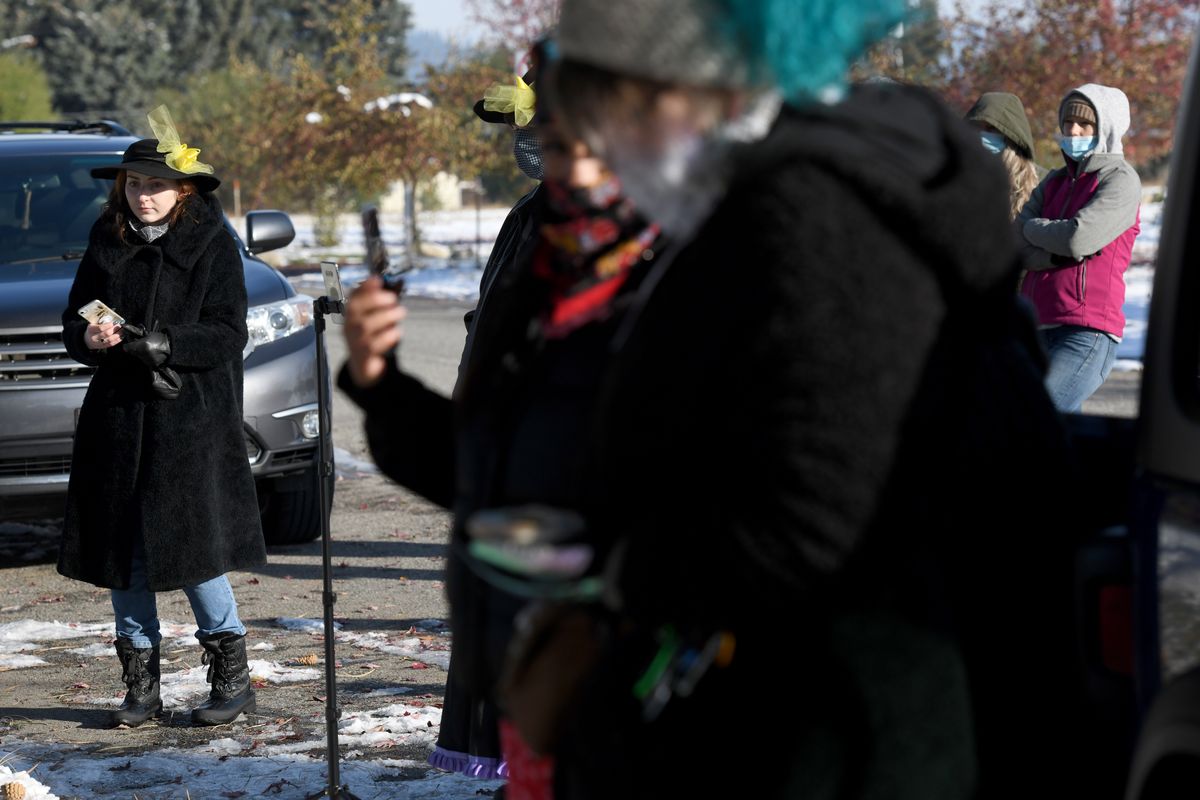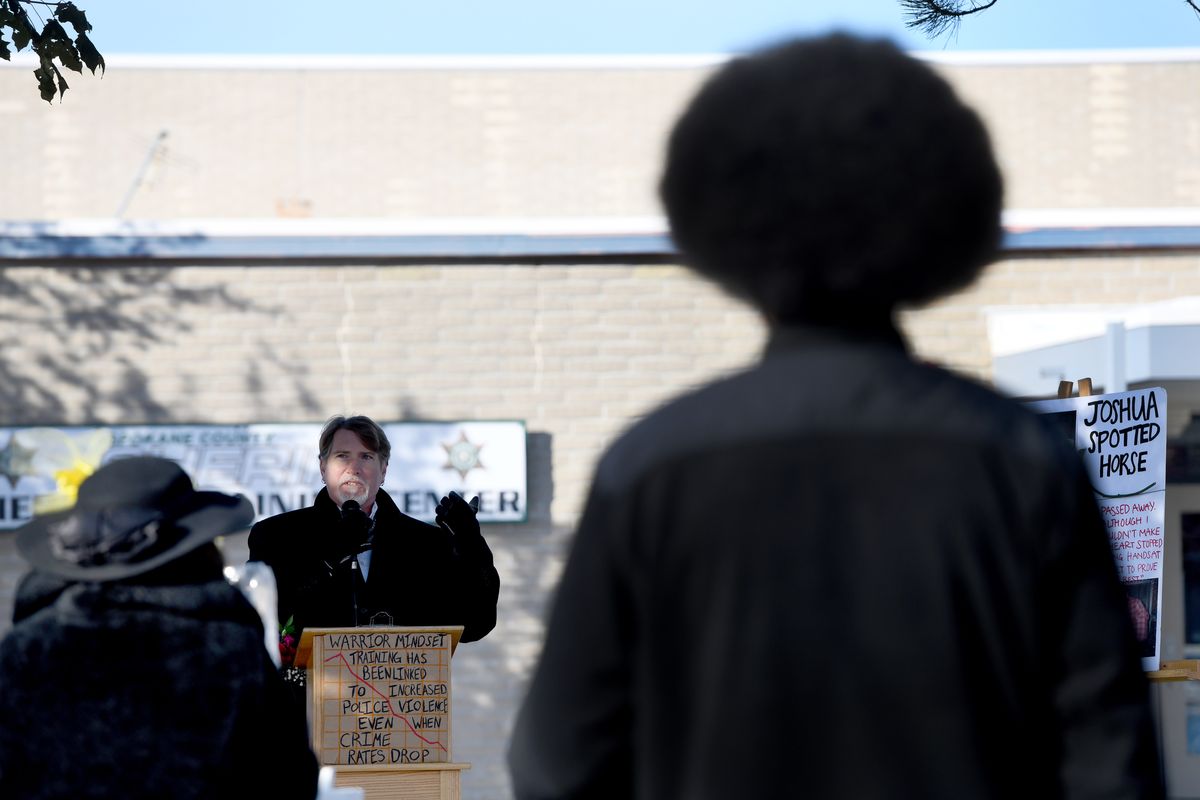Group holds demonstration against ‘warrior-style’ training at Spokane County Sheriff’s Office
Emily Peters, left, spokesperson for Human Rights Activist Coterie, gathers with protesters Tuesday in front of Spokane County Sheriff’s Training Center in opposition to “warrior style” police training in Newman Lake. (Kathy Plonka/The Spokesman-Review)
A small group of demonstrators braved the cold Tuesday to protest ”warrior-style” training sessions used by the Spokane County Sheriff’s Office.
Behind them, in the Spokane County Sheriff’s Training Center, Dave “JD Buck Savage” Smith was teaching his course, “The Winning Mind.”
While the instructors used by the sheriff’s office specifically mention the word “warrior,” Sheriff Ozzie Knezovich insists there isn’t a warrior component to the trainings.
“You cannot find a classic definition of warrior-style training,” Knezovich said. “This is nothing more than activist-created nonsense; there is no such thing as warrior-based training.”
Protesters see it differently.
“These warrior mindset training seminars have a common underlying philosophy that officers should be afraid for their lives in every interaction they have with civilians,” said Emily Peters, spokesperson for the Human Rights Activist Coterie of Spokane, which organized the protest. “They’re taught to watch for signs that someone intends to do them harm. But those signs are also signs of anxiety, which most people experience when interacting with a police officer.”
Protesters spoke to cameras livestreaming the event while surrounded by signs memorializing local people killed by law enforcement.
About 15 people, many of them wearing all black, showed up to attend the funeral-style demonstration by their core members to mourn the lives lost to the mentality the training encourages, Peters said.
How it all began
Protests against warrior-style or warrior mindset trainings began earlier this year after controversy surrounding a scheduled training by Lt. Col. Dave Grossman, who founded the Killology research group. It purports to “study the reactions of healthy people in killing circumstances like police and military in combat.”
In response, Knezovich said he would hold a public forum with Grossman so the public could see what the training was really about, but Grossman canceled his appearance due to COVID-19 restrictions, the sheriff’s office said.
Knezovich has continually said there is no such thing as warrior-style training and that activists who oppose it are uneducated.
“We don’t have warrior-style training; It is a myth,” Knezovich said Tuesday. “Thirty years of doing this job, I have never been trained to be a warrior … It is a myth created by activists and far-left politicians.”
Still, the Spokane City Council voted to condemn the training in August, much like the Mayor of Minneapolis who banned warrior-style training last year.
“The mayor did and that was a political move,” Knezovich said. “That’s a politician making a political move. That’s the same thing the Spokane City Council did.”
The Human Rights Activist Coterie of Spokane used Grossman’s training to outline their issues with warrior-style trainings as a whole, holding continued protests throughout the summer.
A curious public
Originally scheduled to present his course in conjunction with Grossman, Smith continued with his training Tuesday.
Two members of the coterie, Brittany “Reno” Blue and Melanie Perry, purchased tickets to the training in hopes of seeing Smith’s tactics in person.
“We came here with the intention of going in and kind of seeing what they’re going to be teaching the police and what the police are going to be unleashing on the community,” Blue said.
However, the two said they were asked for their badge number or military identification and were told the class wasn’t open to the public when they attempted to enter the course.
The poster for Smith’s course does say it’s “perfect for everyone in your agency from management to recruits, from sworn to civilian.”
Cpl. Mark Gregory, Sheriff’s Office spokesman, said it depends on the training who is allowed to attend but “generally speaking it’s not open to the public.”
Noncommissioned department staff are considered civilians, which Gregory said is likely what the poster was referring to. The training is open to members of law enforcement from any agency.
Blue said she had hoped to see what the training was really like and to come out “armed with knowledge.”
“The police culture is very isolating and it’s a bubble and it’s an echo chamber for them,” Blue said. “When they’re in that environment, they speak freely about what they really think about the training and the people that they’re supposed to be policing.”
Anwar Peace, longtime police accountability activist and member of the Spokane Human Rights Commission, said it’s “disingenuous” for Knezovich to say he would hold a community forum but then continue with Smith’s training.
“Our initial complaint was about Grossman, but the aspect of the warrior-based training philosophy is what the community was so upset about,” Peace said. “I have a major problem with Smith being here and the fact that this sheriff has continuously been disingenuous with his comments to the community about having the NAACP cultural audit; he has stalled that process out.”
However, Knezovich called both Peace and HRAC “disingenuous” and said they had to “find a reason” to protest after Grossman canceled.
The cultural audit was stalled for a month or so but is now back on track, said Kurtis Robinson, president of the NAACP and executive director of I Did the Time and Revive Re-entry Services.
Robinson declined to say what caused the stall but said the NAACP did meet with sheriff’s office staff last week.
“Things got put back into motion and confusion got clarified,” Robinson said. “The sheriff’s staff that we met with face to face have been extremely cooperative and helpful since that meeting.”
Contrasting definitions
Knezovich took issue with Peace bringing up the project at all since he has not been involved.
Ultimately, Peace said Knezovich just hasn’t been as responsive to requests for reform or discussion on race as Spokane Police Department Chief Craig Meidl.
Knezovich said he is known for attending meetings and being willing to meet with people but both HRAC and Peace have not reached out, calling the group “not truthful, honest, genuine people.”
Ahead of his training, Smith pushed back against the idea that warrior-style training is a bad thing, saying there is no real definition.
Just like many other “left-wing ideas, there’s no definition,” Smith said. Knezovich agreed.
At the demonstration Tuesday, Peace offered his definition of warrior-style training.
“Warrior-style training is a philosophy that the officer must assert his authority, first and foremost,” Peace said. “That the officer is the hero in the moment instead of being the guardian of the public.”
A 2015 commentary from the Harvard Law Review said that while a narrow definition of the warrior mindset tells officers they need “the mental tenacity and attitude that officers, like soldiers, are taught to adopt in the face of a life-threatening struggle,” the idea has mutated into something else.
Officers are taught the most important rule of law enforcement is to make it home at the end of every shift, but that’s followed by being taught they are always under attack.
The article posits officer are taught “they live in an intensely hostile world. A world that is, quite literally, gunning for them.”
Knezovich said police trainings do not teach officers to be fearful.
“We do not teach people to be fearful; to teach people to be fearful is counterproductive,” Knezovich said. “The entire idea of de-escalation stems on one thing: the officer being able to control their fear. If you cannot overcome fear, you cannot sit and do the things that you need to do.”
Peace said he hopes to encourage departments to move away from the “us-versus-them” mentality.
While the NAACP was not involved in the protest, Robinson said the group has expressed concerns about warrior-style trainings.
Robinson said he was “disappointed but not surprised” Grossman canceled his appearance rather than working around COVID-19 restrictions.
“There is a saying that I love to use: integrity invites transparency and seeks out accountability,” Robinson said. “This is why the cultural audit with the sheriff’s office is so important and why Mr. Grossman’s response speaks volumes.”
The HRAC has proposed alternative trainings from the men featured in the HBO documentary “Ernie & Joe: Crisis Cops,” which they say would help officers de-escalate situations and have better connections with community members.
Like the demonstrators Tuesday, Robinson said he hopes to see a shift in the entire law enforcement community through better training.
“I think our collective hope is we will see and experience a law enforcement department and community across Washington State that is more geared towards trauma-informed human service, navigating difficult situations in a way that minimizes emotional and physical harm,” Robinson said. “Instead of having a law enforcement community that is coming in pre-escalated instead of de-escalated.”

